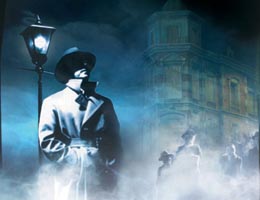
AN
INSPECTOR CALLS
THE ROYAL NATIONAL THEATRE
(TOURING
PRODUCTION)
An Inspector Calls is, of course, the work of Bradford's very own JB Priestley, who penned it just after the Second World War. This Royal National Theatre production marked a sharp and radical revival when it first opened in London in 1992, with the unusual set design sparking much excitement.
Having seen it, I can confirm absolutely marvellous. Oh boy, it's good. Designed by Ian MacNeil, the gasps were almost audible when the curtain went up. But good carpentry and nifty hydraulics alone don't make for an enjoyable night in the stalls.
Originally set in the fictional Northern town of Brumley before WW1, director Stephen Daldry has transported this production into the post-Blitz period. On a dark and stormy evening, the wealthy Birling family are busy toasting a prosperous future when they unexpectedly receive a visit from the enigmatic Inspector Goole.
He informs them of the suicide of a young woman, and although they all flippantly dismiss any connection to her, the Inspector gradually brings each to their knees with guilt, remorse and shame.
The opening is a powerful and striking affair, as a 'front of curtain' scene with children playing on a bombsite gives way to a bleak landscape, pouring rain and the centrepiece of this vaunted production - a dolls house on stilts.
The first ten minutes are very odd, as the house's facade remains closed. We hear the actors and catch glimpses of them through windows, but it's a rather awkward experience. However, it does succeed in putting the family into context immediately - boisterous, larger than life characters who are blissfully isolated from the world outside.
Inspector Goole's entrance is atmospheric, powerful and reminiscent of film noir. With overcoat buttoned and hat pulled down, harsh side lighting casts a sinister shadow over Nicholas Day's features as the fog swirls all around.
It's just a shame some of his profound utterances cannot be taken seriously. The Inspector's line about it being "better to ask for the earth than to take it" is rendered almost comical by an immediate burst of melodramatic sound, echoing something out of a bad Hammer Horror movie.
As Goole, Day gives an admirable performance but lacks real power and depth in his delivery. He impresses during his verbal and mental sparring with Sybil Birling (played by Sandra Duncan), although his shouting and bawling is almost unbearable at times. Inspector Goole's parting shot, where Day turns and looks at the audience and delivers a calm and chilling warning about the need to change attitudes, is perhaps his finest moment.
Duncan commands the stage in imperious fashion, giving a masterful performance woven with razor sharp delivery and delicious timing. Katherine Tozer does a fine job as spoilt daughter Sheila Birling who gradually develops a social conscience, although her performance slides in the melodrama with regularity.
One of the strong points of this play is the great diversity of characters, and David Roper is entertainingly bluff and blustering as Arthur Birling. However, Jamie De Courcey tends to go overboard in his portrayal of foppish son Eric Birling. As toff businessman Gerland Croft, engaged to marry Sheila, Dominic Taylor handles his character's transition into guilt and remorse with great skill and subtlety.
My biggest problem with this production is the flashes of high drama and suspense are not sustained, and the plot drags its feet awkwardly in several places. In trying to hammer home its message - that we all have a social responsibility towards those in society less fortunate than ourselves - Priestley's script is flabby and repetitive.
Sure, Daldry has given it a decent polish and produced something infinitely more bearable - and relevant - than your average traditional amdram performance. But the whole thing is still a bit predictable, contrived and, well, outdated.
At one hour forty-five minutes without an interval, An Inspector Calls is tough going for both the mind and backside. The conclusion is disappointingly limp, especially given the thundering exit of the Inspector some thirty minutes earlier. The fact the audience launched into applause before the final scene had even finished suggested they were eager to put an end to such laboured meandering.
An Inspector Calls isn't a total turkey, and director Daldry has done well to squeeze some nice flashes of humour out of Priestley's original script. But when all said and done, it's difficult to see what all the fuss is about.
Copyright J A Waddington 2003. For syndication rights, please email.
Date: 13th May 2003
Rating: 3/ 5
Reviewed by: Alex Waddington
STUFF
TO BUY:
An Inspector Calls
(Heinemann Plays)
£6.75
An Inspector Calls
(Samuel French)
£6.25
BID FOR CHEAP JB PRIESTLEY BOOKS AND MEMORABILIA ON eBay!!!
York Notes - An Inspector Calls
£3.99
Forthcoming Dates